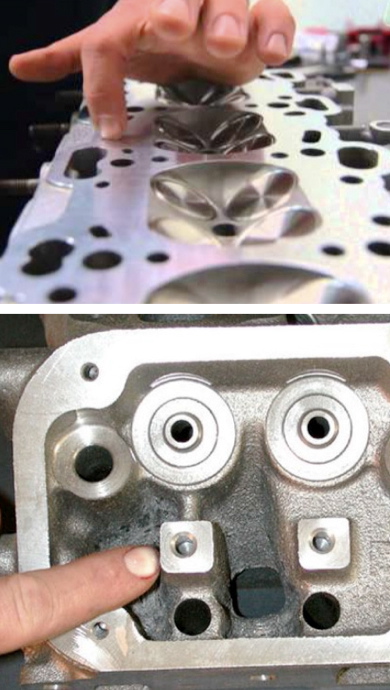
THE MYTH OF THE NEW BARE CASTING
There may be some misconception in the automotive machine world with regards to new cylinder head castings. Over the years new car manufacturers have been very kind to our industry. It seems that every couple of years a new problem cylinder head finds it’s way to the shop counter. Many of these are just not cost affective to repair. They can be difficult to not only repair, but to warrant as well. The aftermarket has answered the call for replacement heads and today the list of available new head castings is quite long. A shop today is blessed with a wide variety of castings to replace pretty much all of the known problem applications. Replacing the casting can be far more favorable to extensive crack repair or welding, on top of numerous seat and guide repairs. Many of these new castings are heavier and thicker in all the right places.- Since the original cataloging for Volkswagon and the 2.6 Mitsubishi heads were published, and on into the 1990’s as the variety of castings exploded, not one manufacturer has advertised that their new bare castings were fully machined and ready to install. Today, castings are coming from many countries from around the world. Quality and price can vary substantially. The finish of machined surfaces can vary between manufacturers and among the products within a different box. For this reason, the savvy shop owner should plan for some machine work. Valve guides must be checked for size and clearance. Valve seats should be cut or ground once valve guides are machined. Concentricity and runout are critical to your valve job and should not be taken for granted if you are putting your shop name on the finished product. We’ve spoken to several manufacturers and though they believe their product is of the highest quality, none will claim that castings are ready for use right out of the box every time. Many are importers and have no control over what goes on at the factory. Your cylinder head gasket seal is just as critical. Most new castings have been machined on a broach. If your head gasket is multi-layer steel, a finer surface finish will be required or you may have some issues with leakage. Again, your name is on the finished assembled product so it must be done right. Today, the price has fallen on many applications and most are much more affordable than the alternative new head from the O.E.M. manufacturer. And, they are very cost affective when compared to extensive repair. When done properly, they should afford the shop confidence in their work. Yet expectations are that a product that might be one fifth the cost of another should be of the same qualities. Simple economics and experience should tell us that this is an unrealistic expectation. And expecting your distributor to pay for your time to do any needed machine operations is just as unrealistic. Reducing the price of the product to save the sale is probably the biggest contributor to any dissatisfaction. Planning for some additional machining, including the valve job that was originally contracted is required to be profitable. The dollars spent up front should give long life to the finished product and will in the long run be the best value for you and your customer.
Engine Pro Tech Committee
December, 2015